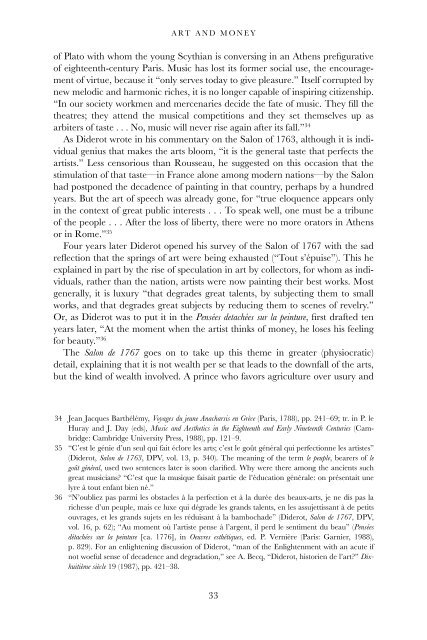Art in its Time: Theories and Practices of Modern Aesthetics
Art in its Time: Theories and Practices of Modern Aesthetics
Art in its Time: Theories and Practices of Modern Aesthetics
You also want an ePaper? Increase the reach of your titles
YUMPU automatically turns print PDFs into web optimized ePapers that Google loves.
ART AND MONEY<br />
<strong>of</strong> Plato with whom the young Scythian is convers<strong>in</strong>g <strong>in</strong> an Athens prefigurative<br />
<strong>of</strong> eighteenth-century Paris. Music has lost <strong>its</strong> former social use, the encouragement<br />
<strong>of</strong> virtue, because it “only serves today to give pleasure.” Itself corrupted by<br />
new melodic <strong>and</strong> harmonic riches, it is no longer capable <strong>of</strong> <strong>in</strong>spir<strong>in</strong>g citizenship.<br />
“In our society workmen <strong>and</strong> mercenaries decide the fate <strong>of</strong> music. They fill the<br />
theatres; they attend the musical competitions <strong>and</strong> they set themselves up as<br />
arbiters <strong>of</strong> taste . . . No, music will never rise aga<strong>in</strong> after <strong>its</strong> fall.” 34<br />
As Diderot wrote <strong>in</strong> his commentary on the Salon <strong>of</strong> 1763, although it is <strong>in</strong>dividual<br />
genius that makes the arts bloom, “it is the general taste that perfects the<br />
artists.” Less censorious than Rousseau, he suggested on this occasion that the<br />
stimulation <strong>of</strong> that taste—<strong>in</strong> France alone among modern nations—by the Salon<br />
had postponed the decadence <strong>of</strong> pa<strong>in</strong>t<strong>in</strong>g <strong>in</strong> that country, perhaps by a hundred<br />
years. But the art <strong>of</strong> speech was already gone, for “true eloquence appears only<br />
<strong>in</strong> the context <strong>of</strong> great public <strong>in</strong>terests . . . To speak well, one must be a tribune<br />
<strong>of</strong> the people . . . After the loss <strong>of</strong> liberty, there were no more orators <strong>in</strong> Athens<br />
or <strong>in</strong> Rome.” 35<br />
Four years later Diderot opened his survey <strong>of</strong> the Salon <strong>of</strong> 1767 with the sad<br />
reflection that the spr<strong>in</strong>gs <strong>of</strong> art were be<strong>in</strong>g exhausted (“Tout s’épuise”). This he<br />
expla<strong>in</strong>ed <strong>in</strong> part by the rise <strong>of</strong> speculation <strong>in</strong> art by collectors, for whom as <strong>in</strong>dividuals,<br />
rather than the nation, artists were now pa<strong>in</strong>t<strong>in</strong>g their best works. Most<br />
generally, it is luxury “that degrades great talents, by subject<strong>in</strong>g them to small<br />
works, <strong>and</strong> that degrades great subjects by reduc<strong>in</strong>g them to scenes <strong>of</strong> revelry.”<br />
Or, as Diderot was to put it <strong>in</strong> the Pensées detachées sur la pe<strong>in</strong>ture, first drafted ten<br />
years later, “At the moment when the artist th<strong>in</strong>ks <strong>of</strong> money, he loses his feel<strong>in</strong>g<br />
for beauty.” 36<br />
The Salon de 1767 goes on to take up this theme <strong>in</strong> greater (physiocratic)<br />
detail, expla<strong>in</strong><strong>in</strong>g that it is not wealth per se that leads to the downfall <strong>of</strong> the arts,<br />
but the k<strong>in</strong>d <strong>of</strong> wealth <strong>in</strong>volved. A pr<strong>in</strong>ce who favors agriculture over usury <strong>and</strong><br />
34 Jean Jacques Barthélémy, Voyages du jeune Anacharsis en Grèce (Paris, 1788), pp. 241–69; tr. <strong>in</strong> P. le<br />
Huray <strong>and</strong> J. Day (eds), Music <strong>and</strong> <strong>Aesthetics</strong> <strong>in</strong> the Eighteenth <strong>and</strong> Early N<strong>in</strong>eteenth Centuries (Cambridge:<br />
Cambridge University Press, 1988), pp. 121–9.<br />
35 “C’est le génie d’un seul qui fait éclore les arts; c’est le goût général qui perfectionne les artistes”<br />
(Diderot, Salon de 1763, DPV, vol. 13, p. 340). The mean<strong>in</strong>g <strong>of</strong> the term le peuple, bearers <strong>of</strong> le<br />
goût général, used two sentences later is soon clarified. Why were there among the ancients such<br />
great musicians? “C’est que la musique faisait partie de l’éducation générale: on présentait une<br />
lyre à tout enfant bien né.”<br />
36 “N’oubliez pas parmi les obstacles à la perfection et à la durée des beaux-arts, je ne dis pas la<br />
richesse d’un peuple, mais ce luxe qui dégrade les gr<strong>and</strong>s talents, en les assujettissant à de pet<strong>its</strong><br />
ouvrages, et les gr<strong>and</strong>s sujets en les réduisant à la bambochade” (Diderot, Salon de 1767, DPV,<br />
vol. 16, p. 62); “Au moment où l’artiste pense à l’argent, il perd le sentiment du beau” (Pensées<br />
détachées sur la pe<strong>in</strong>ture [ca. 1776], <strong>in</strong> Oeuvres esthétiques, ed. P. Vernière (Paris: Garnier, 1988),<br />
p. 829). For an enlighten<strong>in</strong>g discussion <strong>of</strong> Diderot, “man <strong>of</strong> the Enlightenment with an acute if<br />
not woeful sense <strong>of</strong> decadence <strong>and</strong> degradation,” see A. Becq, “Diderot, historien de l’art?” Dixhuitième<br />
siècle 19 (1987), pp. 421–38.<br />
33
















